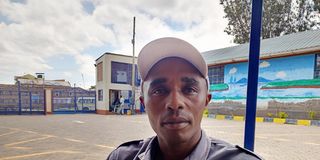'Cancer took my wife, but made me a stronger single dad'

Benson Karanja poses for a photo on 13th June 2025.
When Benson Karanja married his wife, he vowed to love her in health and in sickness. But nothing could have prepared him for just how deeply he would be tested when that sickness arrived—not only for his wife but for his entire family.
Benson’s wife, Beatrice Wangui, was diagnosed with breast cancer in 2018, shortly after they had welcomed their second child.
“We were blessed with our daughter a year after our wedding, and our second-born came in 2014. We were so happy,” he recalls.
Then, in 2018, Wangui found a lump in her breast and the tests confirmed it was cancerous.
Seeking a second opinion, they were told it was not cancer—a contradiction that led to confusion and conflict, not just between them as a couple, but also with Wangui’s family.
She stopped treatment. Life moved forward, and in 2020, they welcomed a third child.
But shortly after, a more devastating diagnosis came; an aggressive form of cervical cancer.
“After that diagnosis, I had to step up fully. Wangui began therapy at Kenyatta National Hospital, and I had to care for our two older children alone. I didn’t have a stable job then—just working as a casual driver. My wife was in the hospital, and the kids were so young. It was overwhelming,” Karanja says.
He recalls how every hospital visit had to be carefully timed: “I’d make sure the children had food for the day before leaving, because some days I’d be gone longer than expected.”
Their daughter, still a child herself, had to step into a role beyond her years sometimes following instructions from her father or getting help from kind neighbors.
The youngest boy stayed with the in-laws who he would later take him to care for him.
In 2023, Wangui’s condition worsened. Doctors advised Karanja to take her home, as the cancer had advanced to stage four and her body was no longer responding to treatment.
“They told me she had about two months to live. It was devastating. I didn’t know how I’d cope—with three children depending on me,” he says
With Wangui at home, Karanja’s days became a delicate balance of caregiving and parenting. He would wake up early to prepare the children for school and have food ready for his wife.
“I had to have an honest conversation with my children about what was happening to their mother. It was hard for them to understand, but I knew it would prepare them emotionally when things got worse. They knew to ask for help if I wasn’t around,” he notes
Wangui lived beyond the two months the doctors had predicted. But in December last year, she passed away.
“That’s when the real journey began. It was tough. But when you're the surviving parent, you don't have the luxury of falling apart. You have to get out of bed every day, hold everything together, and be strong—for the children,” Karanja says.
He knew he couldn’t replace their mother but made sure his children knew one thing for sure, they were loved.
“I always assure them—if they ever need anything, they can come to me. I’m conscious that, as a father, I can’t fully step into a mother’s shoes. Kids naturally run to their moms when they’re hurt or need comfort. Trying to fill that space feels like a non-driver trying to teach someone how to drive,” he admits.
Now with a stable job as a professional driver, Karanja focuses on creating a nurturing environment for his children.
“I make sure my children are surrounded by kind, empathetic people so they don’t feel the gap as much,” he says.
His daughter has since joined a boarding school in high school. At home, his two sons, one in Grade 5 and the other in PP1, require early wake-ups at 4 a.m. so he can drop them off on his way to work which is very early and challenging for them.
“Sometimes I get it wrong, but I try to learn from my mistakes. One thing I’ve held onto is that we always eat together. It’s our moment to connect and for me to really understand how they’re doing,” he says.
Karanja says his parenting style has changed out of necessity. “It’s become a ‘whatever it takes to get through the day’ approach. But that doesn’t mean I let them get away with bad behavior. There’s no excuse for it,”
Through it all, the biggest lesson he’s learned as a widowed father is this: “Life comes with bumps and potholes. You have to handle them with grace. Being responsible and being a father go hand in hand—you can’t separate the two.”


